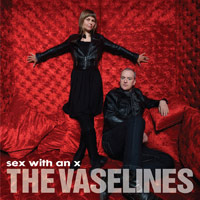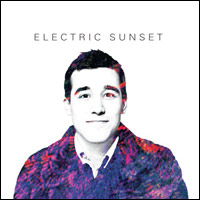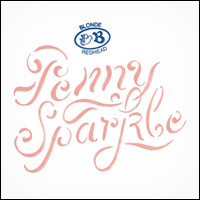
Sex with an X
Sub Pop
Some 20 years ago, the Vaselines had the notoriety of having Kurt Cobain namedropping them as one of his favorites. But by the time he began singing their praises (or at least by the time anyone started listening to him), the Glaswegian band had called it a day after just a couple EPs and one full-length. What they left behind was a gilded mix of frayed guitars, nonchalant cool and sexual innuendo, but it seemed sure that they would never be heard from again.
Fortunately principal Vaselines Eugene Kelly and Francis McKee unexpectedly reconvened a couple years ago to play a benefit and Sub Pop’s birthday party, eventually touring the U.S. for the first time last year. With Belle and Sebastian’s Stevie Jackson (guitar) and Bob Kildea (bass) and the 1990s’ Michael McGaughrin (drums) backing them, Kelly and McKee have created a sophomore album that bears all the vim and vigor of their early work, even if some of the naivety has been replaced by the repose that comes with age. “Ruined” is marked by the same fuzzy stomp and sweet-and-sour vocals that distinguished “Molly’s Lips,” and “Such a Fool” is a jangly swirl of guitars and McKee’s high careening vocals reminiscent of other past glories.
The Vaselines also use the opportunity to take the piss out of kids looking back at their generation with rose-colored glasses. On “I Hate the 80’s,” they sing, “What do you know? You weren’t there. It wasn’t all Duran Duran.... I hate the 80’s ’cause the 80’s were shit.” They’re right, of course, as they themselves made some brilliant records. And now they’ve made another one.
Stephen Slaybaugh
MP3: “I Hate the 80’s”

Interpol
Matador
Interpol exploded onto the music scene in 2002 with a near-flawless debut record, Turn on the Bright Lights, and followed it up with the equally captivating Antics in 2004. They sort of lingered for a few years, and by 2007’s Our Love to Admire, the choppy post-punk sound and boundless spark that made them so intriguing in the first place had all but disappeared. Gone were the clever hooks and dark, unabashed candor, replaced instead with bland, overproduced pop songs that seemed to try too hard. And this year’s self-titled release (perhaps an attempt to revisit their roots) unfortunately never quite lives up to its potential.
Interpol has mastered the art of gloomy soundscapes, and this album is planted within such terrain. But as with Our Love to Admire, much of the gloom sounds manufactured. Interpol, does, however, find the band trying halfheartedly to branch into slightly less rigid territory, layering piano-driven melodies on songs like “Summer Well.” The slightly monotonous “Try It On” utilizes the hidden darkness of the instrument, though, also mixing in ghostly background whistling into the song’s intro.
Paul Banks’ infamous somber drone, a voice that is either beguiling or endlessly exasperating, is back in top form. But whereas it was fresh and exciting on previous albums, this time around, he sounds dull and distant amidst the fluttering drums and atmospheric guitar riffs. Even Banks’ use of the word “fucking” toward the end of the album feels contrived, and sticks out crudely among what are otherwise morosely poetic lyrics. Sure, Interpol hits a high point early on with songs like “Success” and “Lights,” which revisit Antics-era intrigue, but ultimately, the album and every song on it is a set-up for a climax that never ever occurs.
Jennifer Farmer

Electric Sunset
K
While trying at all costs to avoid using some of the terms being bandied about to describe the wave of artists mixing melodic synths and vaguely melancholy undertones, let’s just say that the new project from former Desolation Wilderness frontman Nic Zwart has some of those same chilly qualities. What elevates Electric Sunset above the pack, however, is the clear fact that there is a real pulse at the center of this stunning self-titled debut.
Though from the onset of lead-off track “Palace” the album is awash in shimmery synthetic tones and crackling electronic beats, Zwart hasn’t put his guitar aside. Chiming six-string nodes float in out of focus, either in echoing isolated notes, as on the opening cut, or in reverberating ripples, like on “Morning City.” The effect is mesmerizing, especially with Zwart’s gossamer vocals delivering unobtrusive, yet poignant, couplets. On “Infinity Avenue,” he runs all of it through an oscillating filter, giving a dub feel to the track as he sings about “walking in the sunlight along the waterfront of the city (he) was born in” before a syncopated mechanized rhythm kicks in. The whole record is opalescent and gossamer, full of light and perfect pop, but again with enough of a heartbeat to keep from floating off into the ether. Few albums ever come across so effortlessly wondrous.
Stephen Slaybaugh
MP3: “Soda”

Old Punch Card
Thrill Jockey
According to the press material for Old Punch Card, Sam Prekop challenged himself to “do something completely different from anything else he’s ever created.” He succeeded, and it sounds like it was time and labor intensive. There is no rule that says albums and songs must have hooks or grooves, but judging from Sam Prekop’s musical resume, interesting and catchy songs are part of his vocabulary. Essentially, he’s speaking a foreign language here, though he does let some of his native jazz-pop seep through. Sometimes it’s easy to lose track of actually making appealing songs when you’re face down in a bank of effects and synthesizers trying to coax out the coolest sound you can find, and that’s the problem here. While Prekop did find a few glitches and bloops that sound cool and pleasing, he may have scrolled past them or morphed them or mixed them into oblivion and beyond any sort of hook or groove. Maybe in his quest to create something completely different he decided to ignore his pop instincts and only go with the difficult sound he found. Much of his past work is challenging, even a little tough to listen to at first, but after a little patience it pays off. So, after patiently spending some time with this record, I’m a little skeptical that the synthesized hiss and atonal wibble-wobbles of Old Punch Card are going to pop into my head when I wake up in the morning the way that old Sea and Cake or Shrimp Boat songs sometimes do. Alas, it could be vacuum cleaner sounds sampled against KitchenAid noises and this album would be a breeze to dismiss as a kitschy contrivance to get Sea and Cake fans out to the record store. However, Prekop put a lot of work into this weirdness to make sure it didn’t sound like anything else, so while I doubt that in 10 years’ time Old Punch Card will be a landmark of a career turn, I’m sure that it will always be as out-there as Prekop intended.
Michael O’Shaughnessy
MP3: “The Silhouettes”

Penny Sparkle
4AD
Beginning life as a low-rent take on the kind of dissonance that fellow New Yorkers Sonic Youth had originated years below, Blonde Redhead has since morphed into a band capable of venturing to extremes of both noise and quiet. Since their fifth album, Melody of Certain Damaged Lemons, they have become increasingly nuanced, a swirl of ethereal sounds from varied sources and esoteric lyrics simultaneously evocative and puzzling. In many ways, it’s amazing that a band once seeming so derivative has become so distinctive.
On their eighth album, Penny Sparkle, the trio dabble in electronic noir, dark synth tones speckling the album with a dimmed countenance. It’s a minor alteration in that the band hasn’t diverged from the general tone of past albums (23, Misery Is a Butterfly), but texturally this record has a different skin. Working with Swedish production team Van Rivers and the Subliminal Kid (Fever Ray, Massive Attack), Blonde Redhead has put ambiance before song, with the majority of the record’s 10 tracks being more memorable for how they feel inside your head than for any lyrical or melodic hook. “Here Sometimes” is striking for its rhythmic component, and “Not Getting There” (the album’s shortest cut) is single material for its Cure-like guitar lines. But otherwise Penny Sparkle is an entity unto itself that slithers by, leaving only an oily impression afterwards.
Stephen Slaybaugh
MP3: “Not Getting There”
ALBUM REVIEWS
Titles, Dirt Bell
Film School, Fission
Megafaun, Heretofore
Sonny and the Sunsets, Tomorrow Is Alright
Ray LaMontagne and the Pariah Dogs, God Willin' and the Creek Don't Rise
Geographer, Animal Shapes EP
Land of Talk, Cloak and Cipher
Ra Ra Riot, The Orchard
Brad Laner, Natural Selections
Prisoners, Back in the USSA
Matthew Dear, Black City
Darker My Love, Alive As You Are
Toadies, Feeler
Lissie, Catching a Tiger
